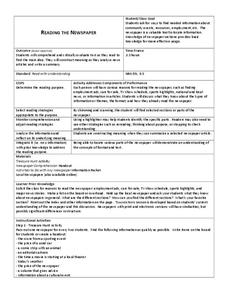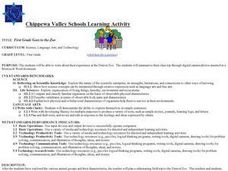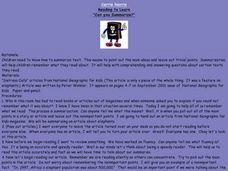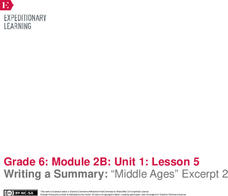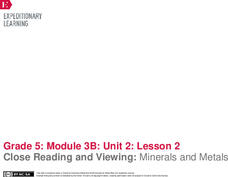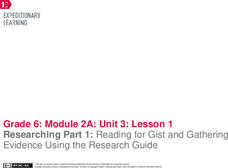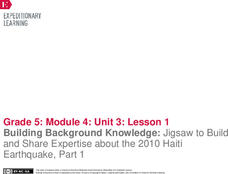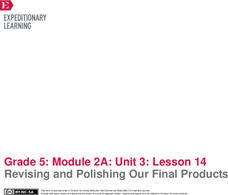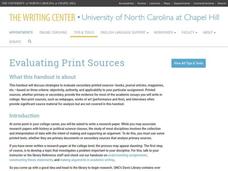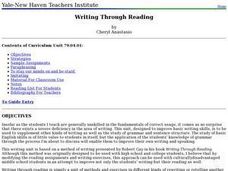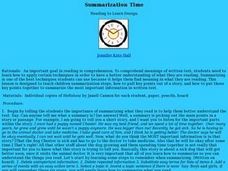Curated OER
Let's Get the Facts!
Students observe and demonstrate the process of summarization. They discuss the three steps of summarization, then silently read a National Geographic Kids News article. As a class they complete a semantic map of the article, and write...
Curated OER
Reading the Newspaper
Students read the newspaper. In this newspaper instructional activity, students become familiar with the various parts of a newspaper. They read specific parts, highlight important information and summarize what they read.
Curated OER
First Grade Goes to the Zoo
First graders summarize their trip to the zoo. In this summarizing lesson plan, 1st graders will study animals that they may see at the zoo including their characteristics and habitats. Once the trip is done, they create a word document...
Curated OER
Context Clues, Plot Structure, Conflict, and Personal Narrative Essay
What are the elements of a personal narrative? Get your class talking by reading "The Necklace" and "A Dangerous Game." The lesson focuses primarily on defining certain vocabulary terms (like context clues, plot, conflict, climax, etc.)...
Curated OER
Can you Summarize?
Students write summaries of non-fiction articles in this activity. They read the article silently and then pick out the main points. Students list the main events as a whole class activity, and then they individually write a summary of...
Curated OER
Summary and "The Fallacy of Success"
Suggested to accompany a class reading of The Great Gatsby, this plan begins with a discussion emphasizing the reputation of Vanderbilt University. Then, after the class has a working knowledge of the wealth associated with the school,...
EngageNY
Writing a Summary: “Middle Ages” Excerpt 1
What's this all about? Scholars learn the importance of summarizing skills using a summary writing graphic organizer. They work with an elbow partner to discuss summaries and complete the organizer using Middle Ages Excerpt 1. Learners...
EngageNY
Writing a Summary: “Middle Ages” Excerpt 2
What is the big idea? Scholars use Middle Ages Excerpt 2 to complete a summary graphic organizer. They then use the information from the organizer to write a summary of the text on lined paper. Learners share summaries with the class.
EngageNY
Close Reading and Viewing: Minerals and Metals
How easy is it to live off the land? Scholars read Minerals and Metals in Your Life and discuss how Canada's natural resources meet the needs of the people. Pupils watch a brief video and discuss the gist of the text and video. They...
EngageNY
Building Background Knowledge: Learning About the Historical and Geographical Setting of Esperanza Rising (Chapter 1: “Aguascalientes, Mexico, 1924”)
Set up your class to read Esperanza Rising, by Pam Muñoz Ryan, through a class read-aloud and exploration of the setting. The detailed instructional activity outlines each step. First, class members read over the first few pages and...
EngageNY
Researching Part 1: Reading for Gist and Gathering Evidence Using the Research Guide
If only life came with an owner's manual. Pupils assemble with their research teams to discuss which of Steve Jobs' rules to live by most resonates with them. Scholars also read informational texts in pursuit of finding the gist and...
EngageNY
Building Background Knowledge: Jigsaw to Build and Share Expertise about the 2010 Haiti Earthquake, Part 1
Using the Jigsaw protocol, scholars study chunks of text from a speech given by former US presidents following a devastating 2010 earthquake in Haiti. As they read the speech in small groups, they build background knowledge and share...
EngageNY
Close Reading: Unpacking Specific Articles of the UDHR
Lesson 6 of this extensive unit finally has your class begin to work their way through specific articles from the text of the Universal Declaration of Human Rights (UDHR). Before examining the rights actually detailed in the...
EngageNY
Revising and Polishing Our Final Products
One, two, three go! Scholars work independently to finalize the three components of their final task. They complete a science journal entry, scientific text box, and scientific drawing. While working, learners sign up for an...
West Virginia Department of Education
Editorials: The Guiding Voice of Authority?
How much can opinion influence a news story? A standalone resource discusses the importance of John Brown's Raid through the lens of journalism. Learners analyze two different texts, one from the perspective of the North and the other of...
National Endowment for the Humanities
Hamlet and the Elizabethan Revenge Ethic in Text and Film
Young scholars research the social context of Elizabethan England for Shakespeare's "Hamlet". They identify cultural influences on the play focusing on the theme of revenge and then analyze and compare film interpretations of the play.
Curated OER
Phineas Gage: Questioning Strategy
Focus on chapter two of Phineas Gage: A Gruesome but True Story About Brain Science with a questioning activity. After teaching and modeling several types of questions, learners work with partners and then independently to answer and...
University of North Carolina
Evaluating Print Sources
Not all sources are created equal, so how do you evaluate them? Writers learn how to evaluate print sources based on elements such as audience, tone, and argument in the sixth handout of 24 in the Writing the Paper series from the...
Curated OER
Reading Comprehension 7: Level 12
A passage about the changing role of home economists provides the text for a reading comprehension strategies instructional activity. Learners must summarize, draw inferences, identify the main idea, and use context clues to determine...
Reed Novel Studies
Beezus and Ramona Novel Study
What are some of the advantages and disadvantages of having siblings? Pupils explore this topic with the Beezus and Ramona novel study. Additionally, scholars answer questions about chapter one of the time-honored book by Beverly Cleary...
Curated OER
Just the Facts, Ma'am
Elementary learners identify the main elements of story structure and form questions to summarize their reading. They listen as the teacher reads a story and then write questions to determine (1) main characters, (2) setting, (3)...
Curated OER
Retelling and Summarizing
Having students use a rubric to score a piece of writing is an excellent practice. They read a passage titled, "Firefighters," and discuss different summaries that were written about it. They evaluate several summaries then score them...
Curated OER
Language Arts: Writing Through Reading
Improve writing skills using methods from Robert Gay's Writing Through Reading; Gay espouses reproducing the work of successful writers to build the ability to convey original ideas effectively. Young writers transcribe, paraphrase,...
Curated OER
Summarization Time
Students write summaries in this lesson. They read "Stellaluna" by Jaell Cannon independently and answer story map questions: who, what, when, where, and why. They then take the answers to these questions and write an individual summary.
Other popular searches
- Summarizing Text Worksheets
- Free Summarizing Text
- Summarizing Text 3rd Grade
- Summarizing Text 2nd Grade
- Summarizing Text Samples
- Summarizing Text 7th Grade
- Summarizing Text Activities
- Summarizing Text Sheets
- Summarizing Text Content
- Summarizing Text Key Points
- Summarizing and Text Structure
- Text Comprehension Summarizing



